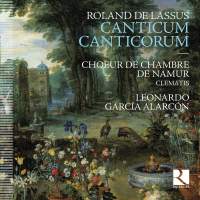Texte paru dans: / Appeared in: |
|
|
Outil de traduction ~ (Très approximatif) |
|
|
Reviewer: J.
F. Weber This program is constructed around the idea of sacred music mixed with secular content. The Mass is based on a (secular) madrigal by Lassus, which is itself set to the Old Testament story of Susanna and the Elders from the Book of Daniel. The Magnificat (one of over 100 settings) is based on a madrigal of Cipriano de Rore (who also wrote a madrigal on Susanne un jour). The eight motets on texts from the Old Testament book Song of Songs are identified here as love songs, although it is important to remember that Scripture scholars of the Middle Ages interpreted the book in the allegorical sense of God’s love for his people, and Renaissance composers understood it that way. (Lassus used three of these motets as the basis for Masses.) Unlike composers such as Palestrina, who published whole books of motets based on this source, Lassus composed only eight single motets, seven of which he published over the course of 30 years (one of them was only posthumously published); all are included here, making a useful group even if it doesn’t count as a published set. The motets are accompanied by an instrumental ensemble except for the first and most impressive, the eight-voice Osculeter me, which uses only a positive organ. The others are variously for four, five, or six voices.
The Magnificat super Ancor che col partire for five voices was once recorded by Alexander Blachly with his excellent Pomerium ensemble, but it was not sent for review. Like all of the composer’s settings, it is in alternatim fashion, leaving the odd-numbered verses in chant psalm tone. The Mass was first recorded by Jeremy Summerly unaccompanied (Fanfare 18:1), but two later versions by Roland Wilson and Stimmwerck added an instrumental ensemble. García Alarcón adds only a positive organ to the vocal group (as also in the Magnificat). García Alarcón has been working with the Namur choir on more than one label, showing an interest in composers more obscure than Lassus. His approach to Lassus is admirably subdued, even with a positive organ in the Mass and Magnificat and soft instruments in the motets. The Mass
as performed under Roland Wilson is a non-starter for me, not only for the
prominent instrumental accompaniment but for the alternation of Mass
movements with motets by Jean de Castro. It is also the fastest of the three
versions that I have heard. Summerly’s Mass, considerably more solemn than
the other two, retains my affection, and it is coupled with another Lassus
Mass. Still, with the unfamiliar motets, García Alarcón offers an
interesting and worthwhile disc. | |
|
|
|
|
Cliquez l'un ou l'autre
bouton pour découvrir bien d'autres critiques de CD |
|




